中国节日介绍英文版
- 格式:doc
- 大小:38.00 KB
- 文档页数:2
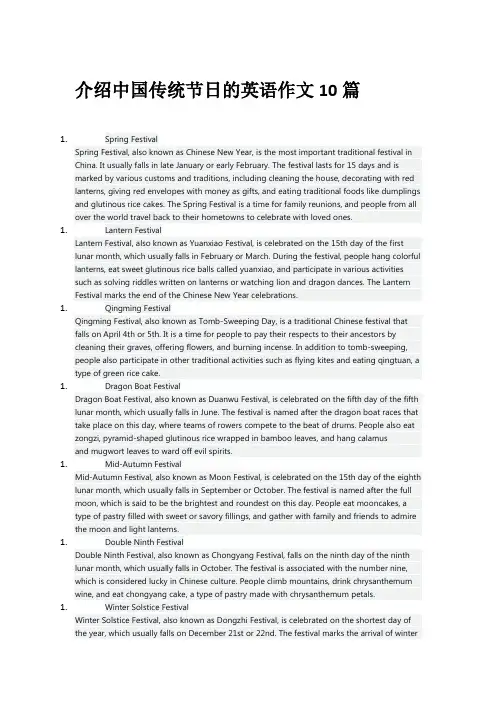
介绍中国传统节日的英语作文10篇1.Spring FestivalSpring Festival, also known as Chinese New Year, is the most important traditional festival in China. It usually falls in late January or early February. The festival lasts for 15 days and ismarked by various customs and traditions, including cleaning the house, decorating with red lanterns, giving red envelopes with money as gifts, and eating traditional foods like dumplings and glutinous rice cakes. The Spring Festival is a time for family reunions, and people from all over the world travel back to their hometowns to celebrate with loved ones.ntern FestivalLantern Festival, also known as Yuanxiao Festival, is celebrated on the 15th day of the first lunar month, which usually falls in February or March. During the festival, people hang colorful lanterns, eat sweet glutinous rice balls called yuanxiao, and participate in various activities such as solving riddles written on lanterns or watching lion and dragon dances. The Lantern Festival marks the end of the Chinese New Year celebrations.1.Qingming FestivalQingming Festival, also known as Tomb-Sweeping Day, is a traditional Chinese festival that falls on April 4th or 5th. It is a time for people to pay their respects to their ancestors bycleaning their graves, offering flowers, and burning incense. In addition to tomb-sweeping, people also participate in other traditional activities such as flying kites and eating qingtuan, a type of green rice cake.1.Dragon Boat FestivalDragon Boat Festival, also known as Duanwu Festival, is celebrated on the fifth day of the fifth lunar month, which usually falls in June. The festival is named after the dragon boat races that take place on this day, where teams of rowers compete to the beat of drums. People also eat zongzi, pyramid-shaped glutinous rice wrapped in bamboo leaves, and hang calamusand mugwort leaves to ward off evil spirits.1.Mid-Autumn FestivalMid-Autumn Festival, also known as Moon Festival, is celebrated on the 15th day of the eighth lunar month, which usually falls in September or October. The festival is named after the full moon, which is said to be the brightest and roundest on this day. People eat mooncakes, a type of pastry filled with sweet or savory fillings, and gather with family and friends to admire the moon and light lanterns.1.Double Ninth FestivalDouble Ninth Festival, also known as Chongyang Festival, falls on the ninth day of the ninth lunar month, which usually falls in October. The festival is associated with the number nine, which is considered lucky in Chinese culture. People climb mountains, drink chrysanthemum wine, and eat chongyang cake, a type of pastry made with chrysanthemum petals.1.Winter Solstice FestivalWinter Solstice Festival, also known as Dongzhi Festival, is celebrated on the shortest day of the year, which usually falls on December 21st or 22nd. The festival marks the arrival of winterand the beginning of longer days. People eat tangyuan, glutinous rice balls filled with sweet or savory fillings, and make offerings to ancestors and deities.1.Ghost FestivalGhost Festival, also known as Hungry Ghost Festival, falls on the 15th day of the seventh lunar month, which usually falls in August or September. The festival is a time to pay respects to the deceased and appease wandering ghosts. People offer food, incense, and paper money to the ghosts and perform traditional rituals to ward off bad luck.ba FestivalLaba Festival falls on the eighth day of the twelfth lunar month, which usually falls in January.The festival is named after the porridge, or laba porridge, that is traditionally eaten on this day.The porridge is made with rice, beans, and various nuts and fruits, and is believed to bring good luck and fortune for the coming year.1.Zhongyuan FestivalZhongyuan Festival, also known as Ghost Month, is a month-long festival that falls on the fifteenth day of the seventh lunar month, which usually falls in August or September. Thefestival is similar to the Ghost Festival, but is a more extended period of time where people pay respects to the deceased and offer food, incense, and paper money to the ghosts. People also perform traditional rituals to ward off bad luck during this time。
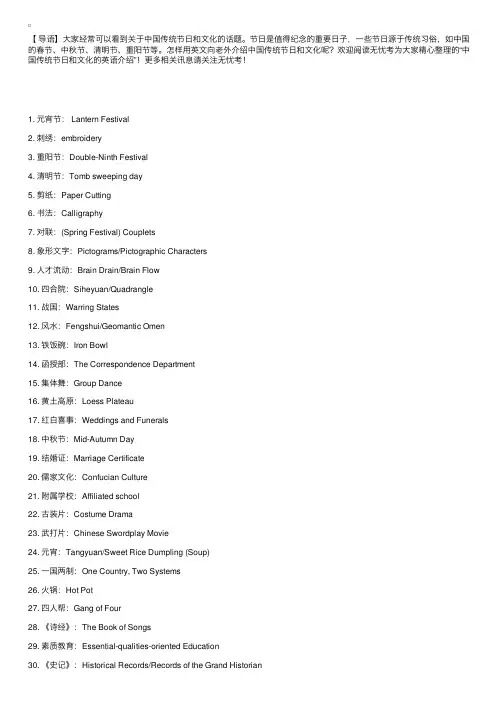
【导语】⼤家经常可以看到关于中国传统节⽇和⽂化的话题。
节⽇是值得纪念的重要⽇⼦,⼀些节⽇源于传统习俗,如中国的春节、中秋节、清明节、重阳节等。
怎样⽤英⽂向⽼外介绍中国传统节⽇和⽂化呢?欢迎阅读⽆忧考为⼤家精⼼整理的“中国传统节⽇和⽂化的英语介绍”!更多相关讯息请关注⽆忧考!1. 元宵节: Lantern Festival2. 刺绣:embroidery3. 重阳节:Double-Ninth Festival4. 清明节:Tomb sweeping day5. 剪纸:Paper Cutting6. 书法:Calligraphy7. 对联:(Spring Festival) Couplets8. 象形⽂字:Pictograms/Pictographic Characters9. ⼈才流动:Brain Drain/Brain Flow10. 四合院:Siheyuan/Quadrangle11. 战国:Warring States12. 风⽔:Fengshui/Geomantic Omen13. 铁饭碗:Iron Bowl14. 函授部:The Correspondence Department15. 集体舞:Group Dance16. 黄⼟⾼原:Loess Plateau17. 红⽩喜事:Weddings and Funerals18. 中秋节:Mid-Autumn Day19. 结婚证:Marriage Certificate20. 儒家⽂化:Confucian Culture21. 附属学校:Affiliated school22. 古装⽚:Costume Drama23. 武打⽚:Chinese Swordplay Movie24. 元宵:Tangyuan/Sweet Rice Dumpling (Soup)25. ⼀国两制:One Country, Two Systems26. ⽕锅:Hot Pot27. 四⼈帮:Gang of Four28. 《诗经》:The Book of Songs29. 素质教育:Essential-qualities-oriented Education30. 《史记》:Historical Records/Records of the Grand Historian31. ⼤跃进:Great Leap Forward (Movement)32. 《西游记》:The Journey to the West33. 除⼣:Chinese New Year’s Eve/Eve of the Spring Festival34. 针灸:Acupuncture35. 唐三彩:Tri-color Pottery of the Tang Dynasty/ The Tang Tri-colored pottery36. 中国特⾊的社会主义:Chinese-charactered Socialist/Socialist with Chinesecharacteristics37. 偏旁:radical38. 孟⼦:Mencius39. 亭/阁: Pavilion/ Attic40. ⼤中型国有企业:Large and Medium-sized State-owned Enterprises41. *:gunpowder42. 农历:Lunar Calendar43. 印/玺:Seal/Stamp44. 物质精神⽂明建设:The Construction of Material Civilization and Spiritual Civilization45. 京剧:Beijing Opera/Peking Opera46. 秦腔:Crying of Qin People/Qin Opera47. 太极拳:Tai Chi48. 独⽣⼦⼥证:The Certificate of One-child49. 天坛:Altar of Heaven in Beijing50. ⼩吃摊:Snack Bar/Snack Stand51. 红双喜:Double Happiness52. 政治辅导员:Political Counselor/School Counselor53. 春卷:Spring Roll(s)54. 莲藕:Lotus Root55. 追星族:Star Struck56. 故宫博物院:The Palace Museum57. 相声:Cross-talk/Comic Dialogue58. 下岗:Lay off/Laid off59. 北京烤鸭:Beijing Roast Duck60. ⾼等⾃学考试:Self-taught Examination of Higher Education61. *:fireworks and firecracker62. 敦煌莫⾼窟:Mogao Caves63. 电视⼩品:TV Sketch/TV Skit64. ⾹港澳门同胞:Compatriots from Hong Kong and Macao65. *:Cultural Revolution66. 长江中下游地区:The Mid-low Reaches of Yangtze River67. 门当户对:Perfect Match/Exact Match68. 《⽔浒》:Water Margin/Outlaws of the Marsh69. 中外合资企业:Joint Ventures70. ⽂房四宝(笔墨纸砚):"The Four Treasure of the Study" "Brush, Inkstick, Paper, and Inkstone"71.兵马俑:cotta Warriors/ Terracotta Army72.旗袍:cheongsam。
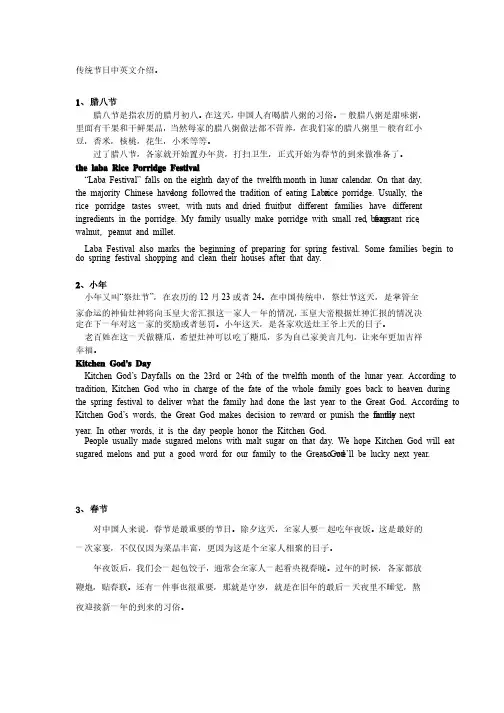
传统节日中英文介绍。
传统节日中英文介绍。
1、 腊八节腊八节是指农历的腊月初八。
在这天,中国人有喝腊八粥的习俗。
一般腊八粥是甜味粥,里面有干果和干鲜果品,当然每家的腊八粥做法都不营养,在我们家的腊八粥里一般有红小豆,香米,核桃,花生,小米等等。
豆,香米,核桃,花生,小米等等。
过了腊八节,各家就开始置办年货,打扫卫生,正式开始为春节的到来做准备了。
过了腊八节,各家就开始置办年货,打扫卫生,正式开始为春节的到来做准备了。
the laba Rice Porridge Festival“Laba Laba Festival” Festival” Festival” falls falls falls on on on the the the eighth day eighth day of of the twelfth the twelfth month month in in in lunar lunar lunar calendar. calendar. calendar. On On On that that that day, day, the majority Chinese have long followed the tradition of eating Laba rice rice porridge. porridge. porridge. Usually, Usually, Usually, the the rice porridge tastes sweet, with nuts and dried fruit, but different families have different ingredients in the porridge. My family usually make porridge with small red beans ,fragrant rice ,walnut ,peanut and millet. Laba Festival also marks the beginning of preparing for spring festival. Some families begin to do spring festival shopping and clean their houses after that day. 2、小年小年又叫“祭灶节”,在农历的12月23或者24。
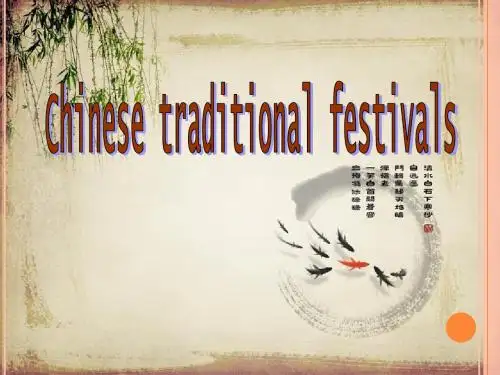
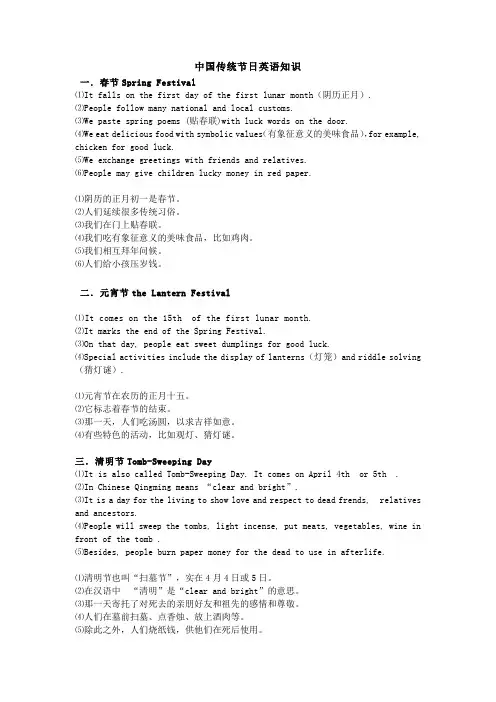
中国传统节日英语知识一.春节Spring Festival⑴It falls on the first day of the first lunar month(阴历正月).⑵People follow many national and local customs.⑶We paste spring poems (贴春联)with luck words on the door.⑷We eat delicious food with symbolic values(有象征意义的美味食品),for example, chicken for good luck.⑸We exchange greetings with friends and relatives.⑹People may give children lucky money in red paper.⑴阴历的正月初一是春节。
⑵人们延续很多传统习俗。
⑶我们在门上贴春联。
⑷我们吃有象征意义的美味食品,比如鸡肉。
⑸我们相互拜年问候。
⑹人们给小孩压岁钱。
二.元宵节the Lantern Festival⑴It comes on the 15th of the first lunar month.⑵It marks the end of the Spring Festival.⑶On that day, people eat sweet dumplings for good luck.⑷Special activities include the display of lanterns(灯笼)and riddle solving (猜灯谜).⑴元宵节在农历的正月十五。
⑵它标志着春节的结束。
⑶那一天,人们吃汤圆,以求吉祥如意。
⑷有些特色的活动,比如观灯、猜灯谜。
三.清明节Tomb-Sweeping Day⑴It is also called Tomb-Sweeping Day. It comes on April 4th or 5th .⑵In Chinese Qingming means “clear and bright”.⑶It is a day for the living to show love and respect to dead frends, relatives and ancestors.⑷People will sweep the tombs, light incense, put meats, vegetables, wine in front of the tomb .⑸Besides, people burn paper money for the dead to use in afterlife.⑴清明节也叫“扫墓节”,实在4月4日或5日。
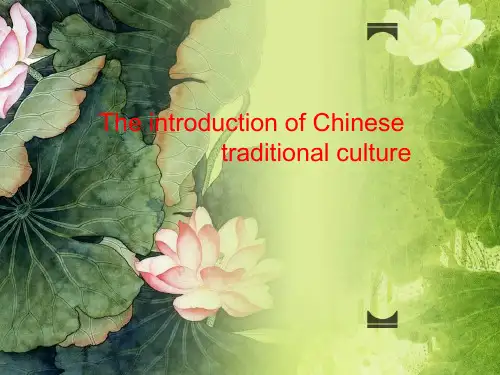
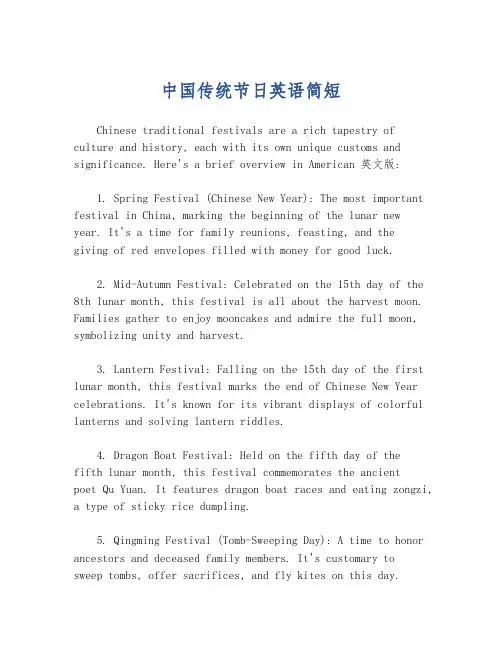
中国传统节日英语简短Chinese traditional festivals are a rich tapestry of culture and history, each with its own unique customs and significance. Here's a brief overview in American 英文版:1. Spring Festival (Chinese New Year): The most important festival in China, marking the beginning of the lunar new year. It's a time for family reunions, feasting, and thegiving of red envelopes filled with money for good luck.2. Mid-Autumn Festival: Celebrated on the 15th day of the 8th lunar month, this festival is all about the harvest moon. Families gather to enjoy mooncakes and admire the full moon, symbolizing unity and harvest.3. Lantern Festival: Falling on the 15th day of the first lunar month, this festival marks the end of Chinese New Year celebrations. It's known for its vibrant displays of colorful lanterns and solving lantern riddles.4. Dragon Boat Festival: Held on the fifth day of thefifth lunar month, this festival commemorates the ancientpoet Qu Yuan. It features dragon boat races and eating zongzi, a type of sticky rice dumpling.5. Qingming Festival (Tomb-Sweeping Day): A time to honor ancestors and deceased family members. It's customary tosweep tombs, offer sacrifices, and fly kites on this day.6. Double Ninth Festival (Chongyang Festival): Celebrated on the ninth day of the ninth lunar month, it's a day to appreciate the elderly and to climb mountains, symbolizing the avoidance of bad luck.7. Double Seventh Festival (Qixi Festival): Oftenreferred to as Chinese Valentine's Day, it celebrates the annual meeting of the Cowherd and the Weaver Girl, represented by the stars Altair and Vega.These festivals are not just dates on the calendar but are living traditions that continue to play a significantrole in the lives of many Chinese people, both in China and around the world.。
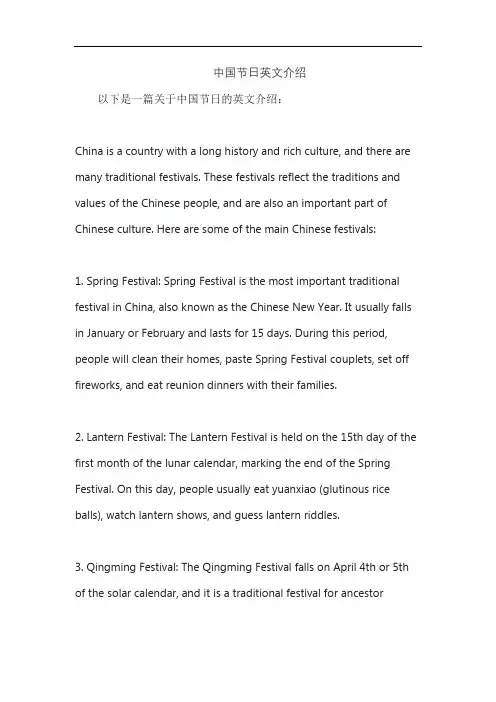
中国节日英文介绍以下是一篇关于中国节日的英文介绍:China is a country with a long history and rich culture, and there are many traditional festivals. These festivals reflect the traditions and values of the Chinese people, and are also an important part of Chinese culture. Here are some of the main Chinese festivals:1. Spring Festival: Spring Festival is the most important traditional festival in China, also known as the Chinese New Year. It usually falls in January or February and lasts for 15 days. During this period, people will clean their homes, paste Spring Festival couplets, set off fireworks, and eat reunion dinners with their families.2. Lantern Festival: The Lantern Festival is held on the 15th day of the first month of the lunar calendar, marking the end of the Spring Festival. On this day, people usually eat yuanxiao (glutinous rice balls), watch lantern shows, and guess lantern riddles.3. Qingming Festival: The Qingming Festival falls on April 4th or 5th of the solar calendar, and it is a traditional festival for ancestorworship and tomb sweeping. People will offer flowers, food, and wine to their ancestors, and clean up the tombs.4. Dragon Boat Festival: The Dragon Boat Festival is held on the fifth day of the fifth month of the lunar calendar, and it is to commemorate the patriotic poet Qu Yuan. On this day, people will eat zongzi (glutinous rice dumplings), watch dragon boat races, and hang mugwort and calamus.5. Mid-Autumn Festival: The Mid-Autumn Festival is held on the 15th day of the eighth month of the lunar calendar, and it is a festival for family reunion. People will eat mooncakes, appreciate the full moon, and tell stories about the moon.These are just some of the Chinese festivals. Each festival has its own unique traditions and cultural connotations, which together constitute the rich and colorful Chinese cultural heritage.。
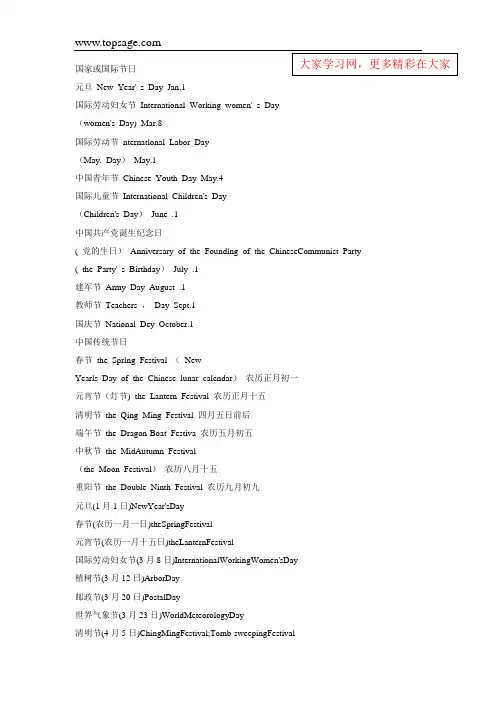
国家或国际节日元旦New Year' s Day Jan.1国际劳动妇女节International Working women' s Day(wornen's Day) Mar.8国际劳动节nternatlonal Labor Day(May. Day)May.1中国青年节Chinese Youth Day May.4国际儿童节International Children's Day(Children's Day)June .1中国共产党诞生纪念日( 党的生日)Anniversary of the Foundlng of the ChineseCommunist Party ( the Party' s Birthday)July .1建军节Army Day August .1教师节Teachers ,Day Sept.1国庆节National Dey October.1中国传统节日春节the Sprlng Festival (NewYearls Day of the Chinese lunar calendar)农历正月初一元宵节(灯节) the Lantern Festival 农历正月十五清明节the Qing Ming Festival 四月五日前后端午节the Dragon-Boat Festiva 农历五月初五中秋节the MidAutumn Festival(the Moon Festival)农历八月十五重阳节the Double Ninth Festival 农历九月初九元旦(1月1日)NewYear'sDay春节(农历一月一日)theSpringFestival元宵节(农历一月十五日)theLanternFestival国际劳动妇女节(3月8日)InternationalWorkingWomen'sDay植树节(3月12日)ArborDay邮政节(3月20日)PostalDay世界气象节(3月23日)WorldMeteorologyDay清明节(4月5日)ChingMingFestival;Tomb-sweepingFestival国际劳动节(5月1日)InternationalLabourDay中国青年节(5月4日)ChineseYouthDay护士节(5月12日)Nurses'Festival端午节(农历五月初五)theDragonBoatFestival国际儿童节(6月1日)InternationalChildren'sDay中国共产党成立纪念日(7月1日)theParty'sBirthday建军节(8月1日)theArmy'sDay中秋节(农历八月十五)Mid-autumn(Moon)Festival教师节(9月10日)Teachers'Day重阳节(农历九月九日)Double-ninthDay国庆节(10月1日)NationalDay除夕(农历十二月三十日)NewYear'sEve阳历节日1月1日元旦(New Year's Day)2月2日世界湿地日(World Wetlands Day)2月14日情人节(Valentine's Day)3月3日全国爱耳日3月5日青年志愿者服务日3月8日国际妇女节(International Women' Day)3月9日保护母亲河日3月12日中国植树节(China Arbor Day)3月14日白色情人节(White Day)3月14日国际警察日(International Policemen' Day)3月15日世界消费者权益日(World Consumer Right Day)3月21日世界森林日(World Forest Day)3月21日世界睡眠日(World Sleep Day)3月22日世界水日(World Water Day)3月23日世界气象日(World Meteorological Day)3月24日世界防治结核病日(World Tuberculosis Day)4月1日愚人节(April Fools' Day)4月5日清明节(Tomb-sweeping Day)4月7日世界卫生日(World Health Day)4月22日世界地球日(World Earth Day)4月26日世界知识产权日(World Intellectual Property Day)5月1日国际劳动节(International Labour Day)5月3日世界哮喘日(World Asthma Day)5月4日中国青年节(Chinese Youth Day)5月8日世界红十字日(World Red-Cross Day)5月12日国际护士节(International Nurse Day)5月15日国际家庭日(International Family Day)5月17日世界电信日(World Telecommunications Day)5月20日全国学生营养日5月23日国际牛奶日(International Milk Day)5月31日世界无烟日(World No-Smoking Day)6月1日国际儿童节(International Children's Day)6月5日世界环境日(International Environment Day)6月6日全国爱眼日6月17日世界防治荒漠化和干旱日(World Day to combat desertification)6月23日国际奥林匹克日(International Olympic Day)6月25日全国土地日6月26日国际禁毒日(International Day Against Drug Abuse and Illicit Trafficking)7月1日中国共产党诞生日(Anniversary of the Founding of the Chinese Communist Party) 7月1日国际建筑日(International Architecture Day)7月7日中国人民抗日战争纪念日7月11日世界人口日(World Population Day)8月1日中国人民解放军建军节(Army Day)8月12日国际青年节(International Youth Day)9月8日国际扫盲日(International Anti-illiteracy Day)9月10日中国教师节(Teacher's Day)9月16日中国脑健康日9月16日国际臭氧层保护日(International Day for the Preservation of the Ozone Layer) 9月20日全国爱牙日9月21日世界停火日(World Cease-fire Day)9月27日世界旅游日(World Tourism Day)10月1日中华人民共和国国庆节(National Day)10月1日国际音乐日(International Music Day)10月1日国际老年人日(International Day of Older Persons)10月4日世界动物日(World Animal Day)10月5日世界教师日(World Teachers' Day)(联合国教科文组织确立)10月8日全国高血压日10月9日世界邮政日(World Post Day)10月10日世界精神卫生日(World Mental Health Day)10月14日世界标准日(World Standards Day)10月15日国际盲人节(International Day of the Blind)10月15日世界农村妇女日(World Rural Women's Day)10月16日世界粮食日(World Food Day)10月17日国际消除贫困日(International Day for the Eradication of Poverty)10月24日联合国日(United Nations Day)10月24日世界发展新闻日(World Development Information Day)10月28日中国男性健康日10月29日国际生物多样性日(International Biodiversity Day)10月31日万圣节(Halloween)11月8日中国记者节11月9日消防宣传日11月14日世界糖尿病日(World Diabetes Day)11月17日国际大学生节11月25日国际消除对妇女的暴力日(International Day For the elimination of Violence agai nst Women)12月1日世界爱滋病日(World AIDS Day)12月3日世界残疾人日(World Disabled Day)12月4日全国法制宣传日12月9日世界足球日(World Football Day)12月25日圣诞节(Christmas Day)12月29日国际生物多样性日(International Biological Diversity Day)1月最后一个星期日国际麻风节3月最后一个完整周的星期一中小学生安全教育日春分月圆后的第一个星期日复活节(Easter Monday)(有可能是3月22-4月25日间的任一天) 5月第二个星期日母亲节(Mother's Day)5月第三个星期日全国助残日6月第三个星期日父亲节(Father's Day)9月第三个星期二国际和平日(International Peace Day)9月第三个星期六全国国防教育日9月第四个星期日国际聋人节(International Day of the Deaf)10月的第一个星期一世界住房日(World Habitat Day)10月的第二个星斯一加拿大感恩节(Thanksgiving Day)10月第二个星期三国际减轻自然灾害日(International Day for Natural Disaster Reduction) 10月第二个星期四世界爱眼日(World Sight Day)11月最后一个星期四美国感恩节(Thanksgiving Day)农历节日农历正月初一春节(the Spring Festival)农历正月十五元宵节(Lantern Festival)农历五月初五端午节(the Dragon-Boat Festival)农历七月初七乞巧节(中国情人节)(Double-Seventh Day)农历八月十五中秋节(the Mid-Autumn Festival)农历九月初九重阳节(the Double Ninth Festival)农历腊月初八腊八节(the laba Rice Porridge Festival)农历腊月二十四传统扫房日。
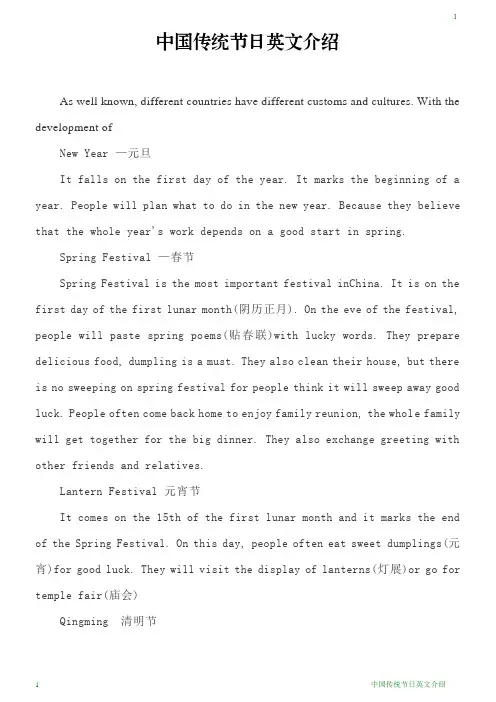
中国传统节日英文介绍As well known, different countries have different customs and cultures. With the development ofNew Year —元旦It falls on the first day of the year. It marks the beginning of a year. People will plan what to do in the new year. Because they believe that the whole year's work depends on a good start in spring.Spring Festival —春节Spring Festival is the most important festival inChina. It is on the first day of the first lunar month(阴历正月). On the eve of the festival, people will paste spring poems(贴春联)with lucky words. They prepare delicious food, dumpling is a must. They also clean their house, but there is no sweeping on spring festival for people think it will sweep away good luck. People often come back home to enjoy family reunion, the whole family will get together for the big dinner. They also exchange greeting with other friends and relatives.Lantern Festival 元宵节It comes on the 15th of the first lunar month and it marks the end of the Spring Festival. On this day, people often eat sweet dumplings(元宵)for good luck. They will visit the display of lanterns(灯展)or go for temple fair(庙会)Qingming 清明节Qingming —It is also called Tomb-Sweeping Day. It falls on April 4th or 5th . That is a special day for the living to show love and respect to their dead friends or relatives. People often go to sweep the tomb and put the meat, wine in front of the tomb. One interesting thing is that people burn the paper money for the dead.Dragon Boat Festival 端午节This day is on the fifth of the fifth lunar month, People often get together to watch the wonderful “Dragon Boat Race”(龙舟大赛),Rice dumpling is a must on Dragon Boat Festival.Mid-autumn Day —中秋节It comes on the 15th of the eighth lunar month. People often gaze at the “Lady in the moon”(嫦娥) and eat moon cakes.中国传统节日英文介绍1. Spring FestivalSpring Festival is known as the most important Festival in China. During the holiday, people go back to hometown from everywhere no matter how far the distance is. They prepare various delicious food and presents for the Spring Festival Eve. Chinese will have a happy family union in the Spring Festival Eve, they believe that’s the end day of last year and they will stay up for good luck until the first day of next year.In China, the most traditional and popular Spring Festival food is dumpling, which looks like the moon with vegetables and meat mixed in it. The Chinese name of dumpling is “JIAO ZI”, ”JIAO”means ”cross”, ”ZI”is Chinese traditional time represents “24:, so the Chinese word “JIAO ZI”means “cross 24:, just the dividing point of last year and nextyear. So when it comes to 24:00, every family begins eating dumplings. Firecracker is also necessary for Spring Festival, the story of Firecracker is: Long ago, in a small village, there appeared a savage animal called “NIAN”, this animal always came out to eat people in the Eve. One day, villagers found three things can make “NIAN”scared: Red color, Fire and noise. So when “NIAN”came again, villagers put up red paper on the door and set firecracker everywhere. After that, “NIAN”disappeared from that village. Now putting up red paper on the door and setting firecracker becomes Spring Festival customs and people believe doing these will bring their family safety.Spring Festival is also the happiest time for children, because they can get red envelope containing money as a gift from the elder. During the Spring Festival, any unfortunate word cannot be heard because it will make people upset and unhappy. People also make use of this holiday to visit their relatives and bring them some presents and well-wishing.2. The Lantern FestivalThe Lantern Festival is January 15 on the lunar calendar. The lunar January is the first month of a year and 15this the first day of full moon. Therefore, Lantern Festival is an important Festival right after Spring Festival.During Lantern Festival, people go along the street to watch lanterns and children light their own small lanterns for some fun. The biggest and most beautiful lantern is the dragon lantern, which looks like a flying dragon, held by several young guys. One with a ball in hand leads the dragon to move.Some lanterns have puzzles on them, called lantern puzzle, the one who gets the answer could receive small presents and be happy for his intelligence.The traditional food for Lantern Festival is rice glue ball. Rice glue ball is a flavor ball with filling in it, for example, peanut filling, sesame filling and jam filling…,the rice glue ball’s shape is just like the full moon appears in the sky. This kind of dessert is especially welcomed by children.3. Tomb- sweeping DayTomb–sweep Day is an ancient festival in spring, also called Qing Ming Festival. In ancient China, the emperor worshipped heaven and earth in order to bless for harvest. People worshipped their ancestors with sacrifice and showed their missing for ancestors.Tomb-sweeping Day, are always rainy days, just like the sky crying for dead people. A Chinese poem described as following:Qing Ming usually comes with rainy daysPassengers on the way are full of sorenessI ask a Buffalo boy for tavern to release my sadnessHe points to the village covered by apricot blossomsThis poem “The Day of Qing Ming”is written by a poet called Du Mu in Tang Dynasty. Qing Ming Festival is the day to worship his mother with family, but the writer goes alone in the rainy days as a passenger far from his hometown, he felt deeply upset and sorrowed. He has to find a tavern to have a drink, perhaps in this way he will release himself from sadness.4. The Dragon Boat FestivalThe Dragon Boat Festival is in May 5thon the lunar calendar. The beginning of this festival is in memory of Qu Yuan, a wise minister and poet in Chu dynasty, who jumped into Mi Luo River in lunar May 5th for despair of country, unfair treat and defamation. People threw rice dumplings to River to protect his body from eating by fish and showed their respect for Qu Yuan’s noble spirit.In recent China, people also eat rice dumplings in Dragon Boat Festival. From the name, we can directly know the campaign of this festival is Dragon Boating. A team of strong men on the Dragon Boat will try their best to win 1st and show Chinese strongest spirits.People use moxa to clean themselves and use five-color thread crossing small children’s arms and fingers to keep illness far away.5. Mid-Autumn DayMid-autumn Day is August 15thon lunar calendar. According to history records, Chinese emperor has tradition that worship the Sun in spring and worship the Moon in autumn. As august 15this exactly the middle of autumn, so it is called Mid-Autumn DayThere are a lot of stories about the moon since ancient China.One most famous story is Chang’e flying to the moon. Thousands of years ago, there were 9 suns in the sky, many people felt too hot to live. A young man called Yi was brave enough and shot 8 suns to the ground and saved people. One day Yi got a potion of elixir from Queen Mother and gave his wife Chang’e to keep. A man named Peng Meng knew about the elixir and wanted to get it from Chang’e. One day when Yi wasout for hunting, Peng Meng went to rob the elixir. In order to protect the elixir, Chang’e swallowed all of the elixir then flied to the moon.In memory of Chang’e, she is recognized as the goddess of the moon.The traditional food of Mid-Autumn Day is Moon cake, a round baked cake with fillings in it. The round shape of moon cake represents family reunion. In the night of Mid-Autumn Day, every family has moon cake and watches the moon.6. The Double Ninth FestivalThe Double Ninth Festival is an important traditional Chinese festival in September 9thon lunar calendar. It is the ninth day of the ninth lunar month, ancient Chinese believes nine represents sun, the brightest thing, September 9th has two nine, the sun is doubled, so call it Double Ninth Festival. Nine also means Long in Chinese words, so the Double Ninth Festival is also recognized The Old Festival.In Double Ninth Festival, people go to their ancestors’tombs to worship with coat for winner.The campaign for Double Ninth Festival is climbing mountain and planting a kind of plant called “Zhu Yu”. A poem written by famous Tang dynasty poet Wang Wei is as following:I stay alone as a visitor in a country foreignThe festival makes me feel homesick and missingMy brothers must have already climbed to High MountainEveryone can plant ZhuYu there except me, a lonely personThis poem’s name is “On the Double-ninth Day thinking of my brothers”. This poem is full of sadness and homesick.In autumn, chrysanthemum is in blossom. People can look at the beautiful flowers and climb mountains as they like.。

中国传统节日No. 1 春节春节,也被称为农历新年。
对于中国人来说,这是规模最大,最重要的传统节日。
就如同西方的圣诞节一样,春节是一家团聚的日子。
The Spring Festival is also called Chinese Lunar New Year. Being one of the traditional Chinese festivals, it is the grandest and most important festival for Chinese people. It is also the time for whole families to get together, which is similar to Christmas for Westerners.春节从农历新年第一天开始,几乎要持续半个月。
但在民间传统中,这一节日从腊月23日就开始了,一直到正月十五(元宵节)。
It comes on the first day of Chinese lunar calendar and lasts for almost half of a month. But in folk custom, this traditional holiday lasts from the 23rd day of the twelfth month to the 15th day of the first month (The Lantern Festival) on the lunar calendar.大年三十(除夕夜):团圆饭就除夕夜而言,无论身在何处,也不管路途多么遥远,人们都会设法赶回家,所以除夕夜的盛大晚餐也叫做“团圆饭”。
每个家庭的团圆饭都是一年中精心准备的最华丽和隆重的家宴。
女主人在餐桌上摆满精心准备的食物,全家人围坐一起分享美味佳肴,然后一起乐融融地包饺子。
午夜12点,每个家庭都会放鞭炮,辞旧迎新。
羀中国节日介绍英文版中国节日介绍英文版羈一、农历节日农历正月初一春节 (the Spring Festival)螃农历正月十五元宵节 (Lantern Festival)莁农历五月初五端午节 (the Dragon-Boat Festival)肀农历七月初七乞巧节 (中国情人节) (Double-Seventh Day)荿农历八月十五中秋节 (the Mid-Autumn Festival)蒅农历九月初九重阳节 (the Double Ninth Festival)莄农历腊月初八腊八节 (the laba Rice Porridge Festival)膀蒆二、阳历节日膆1 月 1 日元旦( New Year's Day)膃2 月 2 日世界湿地日 (World Wetlands Day)芀2 月 14 日情人节 (Valentine's Day)3 月 3 日全国爱耳日袆蚄3 月 5 日青年志愿者服务日羁3 月 8 日国际妇女节 (International Women' Day)莀3 月 9 日保护母亲河日芇3 月 12 日中国植树节 (China Arbor Day)莆3 月 14 日白色情人节 (White Day)蚀3 月 14 日国际警察日 (International Policemen' Day)蒀3 月 15 日世界消费者权益日 (World Consumer Right Day)蚈 3 月 21 日世界森林日(World Forest Day)袄3 月 21 日世界睡眠日 (World Sleep Day)螃3 月 22 日世界水日 (World Water Day)蕿3 月 23 日世界气象日 (World Meteorological Day)袅3 月 24 日世界防治结核病日 (World Tuberculosis Day)薆4 月 1 日愚人节 (April Fools' Day)蒂4 月 5 日清明节( Tomb-sweeping Day)蕿4 月 7 日世界卫生日 (World Health Day)芆4 月 22 日世界地球日 (World Earth Day)羄4 月 26 日世界知识产权日 (World Intellectual Property Day)芁5 月 1 日国际劳动节 (International Labour Day)虿 5 月 3 日世界哮喘日(World Asthma Day)蚇5 月 4 日中国青年节( Chinese Youth Day)蚆5 月 8 日世界红十字日 (World Red-Cross Day)芄5 月 12 日国际护士节 (International Nurse Day)蝿5 月 15 日国际家庭日 (International Family Day)肈5 月 17 日世界电信日 (World Telecommunications Day)膄5 月 20 日全国学生营养日肃5 月 23 日国际牛奶日 (International Milk Day)衿5 月 31 日世界无烟日 (World No-Smoking Day)葿6 月 1 日国际儿童节 (International Children's Day)袅6 月 5 日世界环境日 (International Environment Day)6 月 6 日全国爱眼日袁罿 6 月17 日世界防治荒漠化和干旱日(World Day to combat desertification)薅6 月 23 日国际奥林匹克日 (International Olympic Day)莃 6 月 25 日全国土地日薀6 月 26 日国际禁毒日 (International Day Against Drug Abuse and Illicit Trafficking)聿7 月 1 日中国共产党诞生日 (Anniversary of the Founding of the Chinese Communist Party)羆7 月 1 日国际建筑日( International Architecture Day)肅7 月 7 日中国人民抗日战争纪念日蚃7 月 11 日世界人口日 (World Population Day)腿 8 月 1 日中国人民解放军建军节(Army Day)莇8 月 12 日国际青年节 (International Youth Day)蒃9 月 8 日国际扫盲日 (International Anti-illiteracy Day)蒂9 月 10 日中国教师节 (Teacher's Day)膈9 月 16 日中国脑健康日螈9 月 16 日国际臭氧层保护日 (International Day for the Preservation of the Ozone Layer)9 月 20 日全国爱牙日芅膁9 月 21 日世界停火日 (World Cease-fire Day)芈9 月 27 日世界旅游日 (World Tourism Day)腿10 月 1 日中华人民共和国国庆节 (National Day)蚃10 月 1 日国际音乐日 (International Music Day)芄 10 月 1 日国际老年人日(International Day of Older Persons)For personal use only in study and research; not for commercial use。
元旦New YearIt falls on the first day of the year. It marks the beginning of a year. People will plan what to do in the New Year. Because they believe that the whole year's work depends on a good start in spring.春节Spring FestivalSpring Festival is the most important festival in China. It is on the first day of the first lunar month(阴历正月). On the eve of the festival, people will paste spring poems(贴春联)with lucky words. They prepare delicious food, dumpling is a must. They also clean their house, but there is no sweeping on spring festival for people think it will sweep away good luck. People often come back home to enjoy family reunion, the whole family will get together for the big dinner. They also exchange greeting with other friends and relatives.元宵Lantern FestivalIt comes on the 15th of the first lunar month and it marks the end of the Spring Festival. On this day, people often eat sweet dumplings(元宵)for good luck. They will visit the display of lanterns(灯展)or go for temple fair(庙会)清明QingmingQingming —It is also called Tomb-Sweeping Day. It falls on April 4th or 5th. That is a special day for the living to show love and respect to their dead friends or relatives. People often go to sweep the tomb and put themeat, wine in front of the tomb. One interesting thing is that people burn the paper money for the dead.端午Dragon Boat FestivalThis day is on the fifth of the fifth lunar month, People often get together to watch the wonderful “Dragon Boat Race”(龙舟大赛),Rice dumpling is a must on Dragon Boat Festival.中秋Mid-autumn DayIt comes on the 15th of the eighth lunar month. People often gaze at the “Lady in the moon”(嫦娥) and eat moon cakes.腊月二十三——小年December 23 of the Lunar Calendar (Little New Year) Custom: Worshiping the Kitchen GodAs the legend goes, there is a kitchen god in each house who is responsible for the kitchen and oversees the conduct of the family. On this day, the kitchen god returns to Heaven to report the conducts of the family to the Emperor of Heaven. Therefore, worshipping the kitchen god aims to “please him.” People put out some sweet and sticky foods, such as rice dumplings and malted sugar. In this way, the lips of the kitchen god will stuck together, and he cannot report any wrong doings of the family. Thus the family can lead an auspicious life.习俗:祭灶民俗传说中,每家都有一位灶神掌管饮食,也记录一家人的言行。
中国节日介绍英文版中国节日介绍英文版中国节日介绍英文版一、农历节日农历正月初一春节(the Spring Festival)农历正月十五元宵节(Lantern Festival)农历五月初五端午节(the Dragon-Boat Festival)农历七月初七乞巧节(中国情人节)(Double-Seventh Day) 农历八月十五中秋节(the Mid-Autumn Festival)农历九月初九重阳节(the Double Ninth Festival)农历腊月初八腊八节(the laba Rice Porridge Festival)二、阳历节日1月1日元旦(New Y ear's Day)2月2日世界湿地日(World Wetlands Day)2月14日情人节(V alentine's Day)3月3日全国爱耳日3月5日青年志愿者服务日3月8日国际妇女节(International Women' Day)3月9日保护母亲河日3月12日中国植树节(China Arbor Day)3月14日白色情人节(White Day)3月14日国际警察日(International Policemen' Day)3月15日世界消费者权益日(World Consumer Right Day)3月21日世界森林日(World Forest Day)3月21日世界睡眠日(World Sleep Day)3月22日世界水日(World Water Day)3月23日世界气象日(World Meteorological Day)3月24日世界防治结核病日(World Tuberculosis Day)4月1日愚人节(April Fools' Day)4月5日清明节(Tomb-sweeping Day)4月7日世界卫生日(World Health Day)4月22日世界地球日(World Earth Day)4月26日世界知识产权日(World Intellectual Property Day) 5月1日国际劳动节(International Labour Day)5月3日世界哮喘日(World Asthma Day)5月4日中国青年节(Chinese Y outh Day)5月8日世界红十字日(World Red-Cross Day)5月12日国际护士节(International Nurse Day)5月15日国际家庭日(International Family Day)5月17日世界电信日(World Telecommunications Day)5月20日全国学生营养日5月23日国际牛奶日(International Milk Day)5月31日世界无烟日(World No-Smoking Day)6月1日国际儿童节(International Children's Day)6月5日世界环境日(International Environment Day)6月6日全国爱眼日6月17日世界防治荒漠化和干旱日(World Day to combat desertification)6月23日国际奥林匹克日(International Olympic Day)6月25日全国土地日6月26日国际禁毒日(International Day Against Drug Abuse and Illicit Trafficking)7月1日中国共产党诞生日(Anniversary of the Founding of the Chinese Communist Party) 7月1日国际建筑日(International Architecture Day)7月7日中国人民抗日战争纪念日7月11日世界人口日(World Population Day)8月1日中国人民解放军建军节(Army Day)8月12日国际青年节(International Y outh Day)9月8日国际扫盲日(International Anti-illiteracy Day)9月10日中国教师节(Teacher's Day)9月16日中国脑健康日9月16日国际臭氧层保护日(International Day for the Preservation of the Ozone Layer)9月20日全国爱牙日9月21日世界停火日(World Cease-fire Day)9月27日世界旅游日(World Tourism Day)10月1日中华人民共和国国庆节(National Day)10月1日国际音乐日(International Music Day)10月1日国际老年人日(International Day of Older Persons)。
中国节日英语大观**Festivals in China: A Glimpse into the Vibrant Cultural Heritage**China, a land rich in history and tradition, boasts a diverse array of festivals that celebrate various aspects of its rich cultural heritage. These festivals, steeped in legend and symbolism, reflect the values, beliefs, and lifestyles of the Chinese people. From the joyous Spring Festival to the moonlit Mid-Autumn Festival, each celebration is unique in its own way, offering a windowinto the soul of Chinese culture.**1. The Spring Festival (Chinese New Year)**Known as the "Chinese New Year," the Spring Festival is the most important and festive holiday in China. It marks the beginning of the lunar new year and is a time forfamily reunions, feasting, and giving red envelopes (hongbao) filled with money. The festival is also known for its vibrant dragon and lion dances, fireworks displays, and the setting off of fireworks.**2. The Lantern Festival (Yuanxiao Festival)**Falling on the 15th day of the first lunar month, the Lantern Festival is marked by the hanging of lanterns and the eating of sweet dumplings called "yuanxiao." This festival symbolizes the end of winter and the coming of spring, with lanterns representing light and hope.**3. The Tomb-Sweeping Festival (Qingming Festival)** Observed on the 106th day after the winter solstice, the Tomb-Sweeping Festival is a time for remembering ancestors and paying respects to departed loved ones. It is marked by the cleaning of graves, offering incense and paper money, and flying paper lanterns to symbolize the release of one's ancestors' spirits.**4. The Dragon Boat Festival (Duanwu Festival)**The Dragon Boat Festival, falling on the fifth day of the fifth lunar month, commemorates the ancient Chinese poet Qu Yuan. It is marked by dragon boat races, the eating of zongzi (rice dumplings wrapped in bamboo leaves), and hanging moxa and calamus to ward off evil spirits.**5. The Mid-Autumn Festival**The Mid-Autumn Festival, which falls on the 15th day of the eighth lunar month, is a time for family reunions and moon gazing. It is marked by the eating of mooncakes, a round dessert that symbolizes completeness and unity, and the telling of stories about the Jade Rabbit and the Moon Goddess.**6. The Double Ninth Festival (Chongyang Festival)** Observed on the ninth day of the ninth lunar month, the Double Ninth Festival is a time for climbing mountains, drinking chrysanthemum wine, and wearing dogwood amulets to ward off evil. This festival also symbolizes respect for the elderly and is a time for family members to show their love and care for their elderly relatives.**7. The Winter Solstice Festival**The Winter Solstice Festival, which falls on the 21st or 22nd day of the eleventh lunar month, marks the shortest day and longest night of the year. It is a time for family reunions and the eating of dumplings, a traditional Chinese food that symbolizes unity and prosperity.These festivals, each with its own unique traditionsand meanings, are not just celebrations but also powerful representations of Chinese culture and values. They serveas reminders of the rich heritage that the Chinese people have inherited over the centuries and continue to cherish today.**中国节日概览**中国,这个历史悠久、传统深厚的国家,拥有丰富多彩的节日,彰显着其独特的文化遗产。
中国传统节日(中英文对照)中国传统节日(中英文对照简介)目录The Spring Festival(春节)Lantern Festival(元宵节)Qingming Festival(清明节)Dragon Boat Festival(端午节)Double Seventh Festival(七夕)Mid-Autumn Festival(中秋节)Double Ninth Festival(重阳节)Winter Solstice Festival(冬至)together to have dinner while watching TV programs.For Chinese at home and abroad, the Spring Festival is always the most important festival.农历的正(zheng)月初一,是中国的农历新年。
在中国的传统节日中,这是一个最重要、最热闹的节日。
因为过农历新年的时候,正是冬末春初,所以人们也把这个节日叫“春节”。
中国人过春节有很多传统习俗。
从腊月二十三起,人们就开始准备过年了。
在这段时间里,家家户户要大扫除,买年货,贴窗花,挂年画,写春联,蒸年糕,做好各种食品,准备辞旧迎新。
春节的前夜叫“除夕”。
除夕之夜,是家人团聚的时候。
一家人围坐在一起,吃一顿丰盛的年夜饭,说说笑笑,直到天亮,这叫守岁。
除夕零点的钟声一响,人们还要吃饺子。
古时候叫零点为“子时”,除夕的子时正是新旧年交替的时候,人们在这时吃饺子,是取“更岁交子”的意思。
这也是“饺子”名称的由来。
过了除夕就是大年初一。
从初一开始,人们要走亲戚、看朋友,互相拜年。
拜年,是春节的重要习俗。
拜年时,大家都要说一些祝愿幸福、健康的吉祥话。
放爆竹是春节期间孩子们最喜欢的活动。
传说燃放爆竹可以驱妖除魔,所以每年从除夕之夜起,到处就响起了接连不断的爆竹声。
阵阵烟花,声声爆竹,给节日增添了喜庆的气氛。
中国节日介绍英文版中国节日介绍英文版
一、农历节日
农历正月初一春节(the Spring Festival)
农历正月十五元宵节(Lantern Festival)
农历五月初五端午节(the Dragon-Boat Festival)
农历七月初七乞巧节(中国情人节)(Double-Seventh Day) 农历八月十五中秋节(the Mid-Autumn Festival)
农历九月初九重阳节(the Double Ninth Festival)
农历腊月初八腊八节(the laba Rice Porridge Festival)
二、阳历节日
1月1日元旦(New Y ear's Day)
2月2日世界湿地日(World Wetlands Day)
2月14日情人节(V alentine's Day)
3月3日全国爱耳日
3月5日青年志愿者服务日
3月8日国际妇女节(International Women' Day)
3月9日保护母亲河日
3月12日中国植树节(China Arbor Day)
3月14日白色情人节(White Day)
3月14日国际警察日(International Policemen' Day)
3月15日世界消费者权益日(World Consumer Right Day)3月21日世界森林日(World Forest Day)
3月21日世界睡眠日(World Sleep Day)
3月22日世界水日(World Water Day)
3月23日世界气象日(World Meteorological Day)
3月24日世界防治结核病日(World Tuberculosis Day)
4月1日愚人节(April Fools' Day)
4月5日清明节(Tomb-sweeping Day)
4月7日世界卫生日(World Health Day)
4月22日世界地球日(World Earth Day)
4月26日世界知识产权日(World Intellectual Property Day) 5月1日国际劳动节(International Labour Day)
5月3日世界哮喘日(World Asthma Day)
5月4日中国青年节(Chinese Y outh Day)
5月8日世界红十字日(World Red-Cross Day)
5月12日国际护士节(International Nurse Day)
5月15日国际家庭日(International Family Day)
5月17日世界电信日(World Telecommunications Day)
5月20日全国学生营养日
5月23日国际牛奶日(International Milk Day)
5月31日世界无烟日(World No-Smoking Day)
6月1日国际儿童节(International Children's Day)
6月5日世界环境日(International Environment Day)
6月6日全国爱眼日
6月17日世界防治荒漠化和干旱日(World Day to combat desertification)
6月23日国际奥林匹克日(International Olympic Day)
6月25日全国土地日
6月26日国际禁毒日(International Day Against Drug Abuse and Illicit Trafficking)
7月1日中国共产党诞生日(Anniversary of the Founding of the Chinese Communist Party) 7月1日国际建筑日(International Architecture Day)
7月7日中国人民抗日战争纪念日
7月11日世界人口日(World Population Day)
8月1日中国人民解放军建军节(Army Day)
8月12日国际青年节(International Y outh Day)
9月8日国际扫盲日(International Anti-illiteracy Day)
9月10日中国教师节(Teacher's Day)
9月16日中国脑健康日
9月16日国际臭氧层保护日(International Day for the Preservation of the Ozone Layer)
9月20日全国爱牙日
9月21日世界停火日(World Cease-fire Day)
9月27日世界旅游日(World Tourism Day)
10月1日中华人民共和国国庆节(National Day)
10月1日国际音乐日(International Music Day)
10月1日国际老年人日(International Day of Older Persons)。